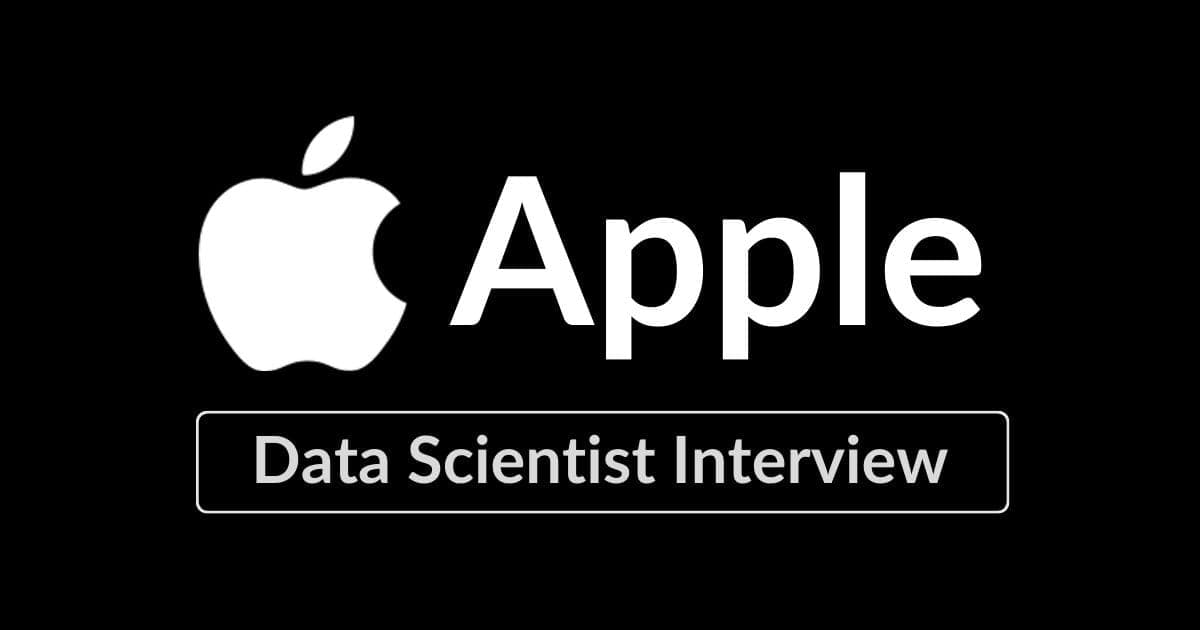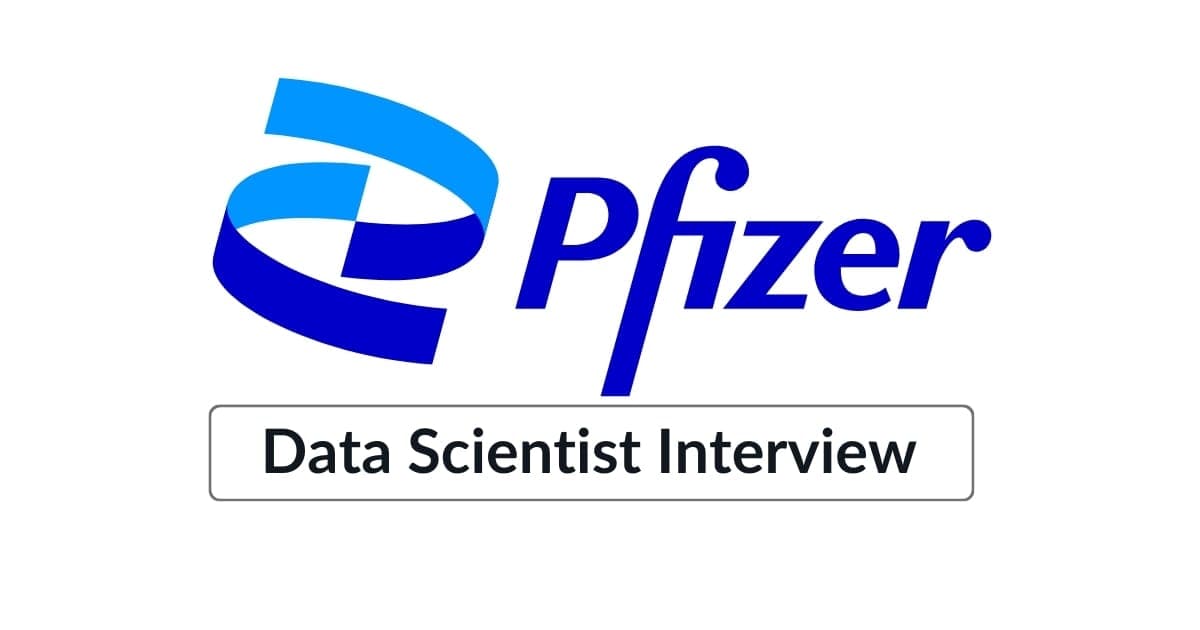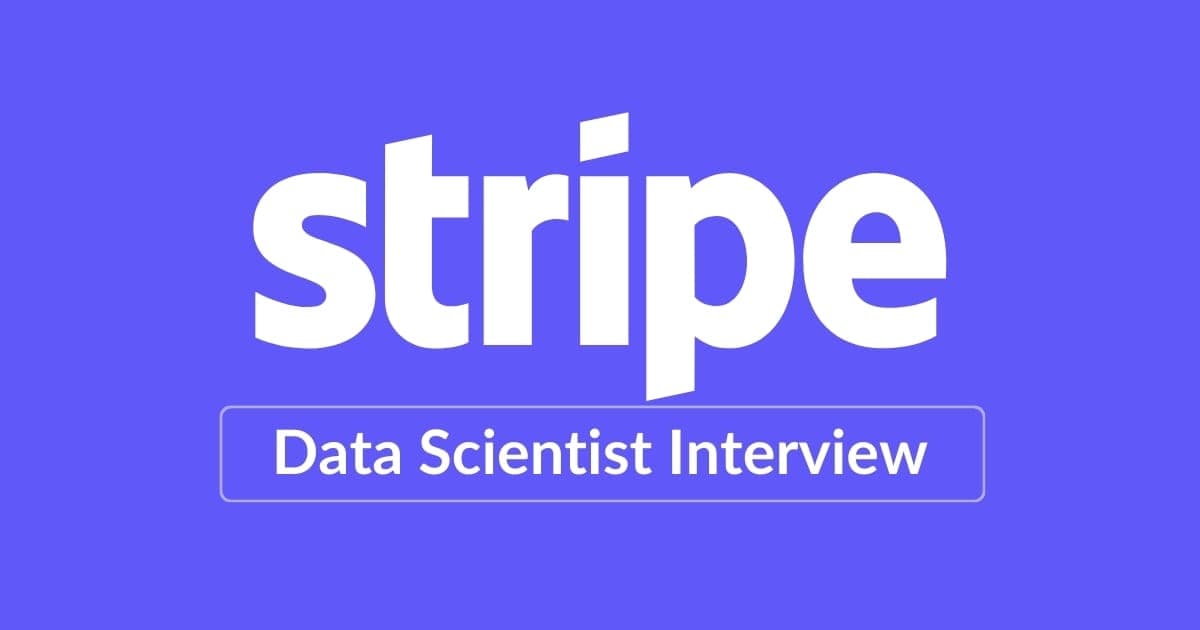Are you preparing for a Data Scientist interview at Apple? This detailed guide will walk you through Apple’s interview process, key focus areas, and strategies to help you stand out.
Whether you’re an experienced data professional or taking the next step in your career, understanding Apple’s unique approach to interviewing can give you a competitive edge.
We’ll cover the interview structure, delve into the types of questions asked, and share tips to help you navigate each stage with confidence.
Let’s dive in 👇
1. Apple Data Scientist Job
1.1 Role Overview
At Apple, Data Scientists are instrumental in shaping the future of cutting-edge products and services like the App Store, Apple Music, and iCloud through data-driven innovation. This role demands a blend of technical expertise, analytical acumen, and a deep understanding of business strategy to uncover insights that drive impactful decisions. As a Data Scientist at Apple, you’ll collaborate with cross-functional teams to address complex challenges and help create a seamless user experience.
Key Responsibilities:
- Design and execute analytical projects to optimize the performance of Apple’s subscription services.
- Develop machine learning models to identify causal relationships and inform business strategy.
- Create and maintain dashboards using tools like Tableau to aid decision-making for key stakeholders.
- Analyze large-scale datasets to uncover trends and drive actionable insights.
- Design experiments (e.g., A/B testing) to measure the impact of product and strategy changes.
- Collaborate with teams across engineering, marketing, and finance to align on key performance indicators and democratize data access.
- Ensure data quality, build robust pipelines, and create ETL processes to support analytics deliverables.
Skills and Qualifications:
- Proficiency in SQL, Python, and statistical analysis.
- Experience with machine learning algorithms and advanced data modeling techniques.
- Expertise in data visualization tools such as Tableau.
- Strong knowledge of A/B testing and experimental design principles.
- Ability to manage end-to-end projects, including roadmap creation, risk identification, and impact assessment.
- Excellent communication skills to translate data insights into strategic recommendations.
1.2 Compensation and Benefits
Apple offers one of the most competitive compensation packages in the industry, reflecting the company’s commitment to attracting and retaining top talent. Compensation includes base salary, performance bonuses, and stock options, along with a range of benefits that promote work-life balance and professional growth.
Example Compensation Breakdown by Level:
| Level Name | Total Compensation | Base Salary | Stock (/yr) | Bonus |
|---|---|---|---|---|
| ICT2 (Junior Data Scientist) | $124K | $116K | $7.6K | $385 |
| ICT3 (Data Scientist) | $214K | $163K | $41.1K | $9.8K |
| ICT4 (Senior Data Scientist) | $320K | $197K | $104K | $19K |
| ICT5 (Principal Data Scientist) | $493K | $278K | $194K | $21.2K |
Additional Benefits:
- Participation in Apple’s stock programs, including restricted stock units (RSUs) and the Employee Stock Purchase Plan.
- Comprehensive medical and dental coverage.
- Tuition reimbursement for education related to career advancement.
- Discounts on Apple products and services.
- Flexible relocation support and discretionary bonuses.
Tips for Negotiation:
- Research compensation benchmarks for data scientist roles in your area to understand the market range.
- Focus on Apple’s total compensation package, which includes stock options, bonuses, and benefits alongside the base salary.
- Highlight your unique contributions and experiences during negotiations to maximize your offer.
Apple’s compensation structure is designed to reward innovation, collaboration, and excellence. For more details, visit Apple’s careers page.
2. Interview Process and Timeline
Average Timeline: 4-6 weeks
2.1 Resume Screen (1-2 Weeks)
The first stage of Apple’s Data Scientist interview process is a resume review. Recruiters evaluate your background to ensure it aligns with the job requirements. As this step is highly competitive, presenting a strong, tailored resume is crucial.
What Apple Looks For:
- Proficiency in Python, SQL, and advanced statistical analysis.
- Experience in product metrics and designing & analyzing AB testing.
- Experience working with large-scale datasets and developing machine learning models.
- Projects that demonstrate innovation, business impact, and collaboration.
Tips for Success:
- Highlight experience with subscription services, customer segmentation, or predictive modeling.
- Emphasize projects involving A/B testing, machine learning, or causal inference.
- Use keywords like "data-driven decision-making," "statistical modeling," and "SQL."
- Tailor your resume to showcase alignment with Apple’s mission of creating innovative solutions and user-first experiences.
2.2 Recruiter Phone Screen (20-30 Minutes)
In this initial call, the recruiter reviews your background, skills, and motivation for applying to Apple. They will provide an overview of the interview process and discuss your fit for the Data Scientist role.
Example Questions:
- Can you describe a time when your analysis directly influenced a business decision?
- What tools and techniques do you use to clean and analyze large datasets?
- How have you contributed to cross-functional team projects?
Prepare a concise summary of your experience, focusing on key accomplishments and business impact.
2.3 Technical Screen (45-60 Minutes)
This round evaluates your technical skills and problem-solving abilities. It typically involves live coding exercises, data analysis questions, and case-based discussions, conducted via an interactive platform like CoderPad.
Focus Areas:
- SQL: Write queries using joins, aggregations, subqueries, and window functions.
- Statistical Analysis: Explain concepts like hypothesis testing, regression, and causal inference.
- Machine Learning: Discuss model evaluation metrics, bias-variance tradeoffs, and feature engineering.
- Product Case Analysis: Analyze data to generate actionable insights and propose business recommendations.
Preparation Tips:
Practice SQL queries involving real-world scenarios, focusing on subscriptions and user behavior data. You can practice SQL questions on DataInterview SQL engine.
2.4 Onsite Interviews (3-5 Hours)
The onsite interview typically consists of 4-6 rounds with data scientists, managers, and cross-functional partners. Each round is designed to assess specific competencies.
Key Components:
- SQL and Coding Challenges: Solve live exercises that test your ability to manipulate and analyze data effectively.
- Real-World Business Problems: Address complex scenarios involving A/B testing, churn prediction, or machine learning models.
- Product Case Studies: Define key metrics, evaluate product performance, and propose data-driven improvements.
- Behavioral Interviews: Discuss past projects, collaboration, and adaptability to demonstrate cultural alignment with Apple.
Preparation Tips:
- Review core data science topics, including statistical testing, experiment design, and machine learning algorithms.
- Research Apple’s products and services, especially subscription-based offerings, and think about how data science could enhance them.
- Practice structured and clear communication of your solutions, emphasizing actionable insights.
For Personalized Guidance:
Consider mock interviews or coaching sessions to simulate the experience and receive tailored feedback. This can help you fine-tune your responses and build confidence. Also, consider joining the Data Scientist Interview MasterClass for structured prep!
3. Interview Questions
3.1 Product Case Questions
Product case questions at Apple evaluate your ability to define metrics, analyze business problems, and propose actionable solutions using data-driven insights.
Example Questions:
- What metrics would you track to evaluate the success of Apple Music’s personalized recommendations?
- How would you design an experiment to test the impact of a new pricing strategy for Apple One subscriptions?
- What data would you analyze to identify factors driving churn among iCloud users?
- If Apple wanted to expand its subscription services into a new region, what factors would you consider to assess market demand and profitability?
- How would you propose optimizing App Store search rankings for better discoverability of apps?
3.2 Machine Learning Questions
Machine learning questions assess your knowledge of algorithms, model building, and problem-solving techniques applicable to Apple’s products and services.
Example Questions:
- Explain the bias-variance tradeoff and how it applies to building a predictive model for App Store recommendations.
- How would you design a machine learning model to predict customer churn for Apple’s subscription services?
- Describe how you would evaluate the performance of a recommendation algorithm used in Apple Music.
- How would you handle class imbalance in a dataset when building a predictive model for iCloud storage upgrades?
- What features would you prioritize for building a model to recommend Apple Fitness+ content to users?
For more interview questions, check out the Machine Learning Interview Guide.
3.3 SQL Questions
SQL questions assess your ability to manipulate and analyze data using complex queries. Below are example tables Apple might use during the SQL round of the interview:
Subscriptions Table:
| SubscriptionID | UserID | ProductName | PurchaseDate | SubscriptionStatus | RenewalDate | Price |
|---|---|---|---|---|---|---|
| 1 | 101 | Apple Music | 2024-11-20 | Active | 2024-12-20 | 9.99 |
| 2 | 102 | iCloud | 2024-10-15 | Expired | NULL | 2.99 |
| 3 | 103 | Apple One | 2024-09-01 | Active | 2024-11-01 | 14.99 |
Users Table:
| UserID | Name | Country | JoinDate | DeviceType |
|---|---|---|---|---|
| 101 | Alice Smith | USA | 2023-02-15 | iPhone |
| 102 | Bob Johnson | Canada | 2022-11-10 | iPad |
| 103 | Carla Diaz | UK | 2021-08-25 | MacBook |
Example Questions:
- Subscription Revenue: Write a query to calculate total subscription revenue by product.
- Active Users: Write a query to find users with active subscriptions in the past 30 days.
- Renewal Analysis: Write a query to identify users whose subscriptions are set to renew within the next week.
- Churn Analysis: Write a query to find the percentage of expired subscriptions by product type.
- User Engagement: Write a query to determine the average subscription price by device type.
You can practice easy to hard-level SQL questions on DataInterview SQL pad.
3.4 Behavioral Questions
Behavioral questions assess your ability to work collaboratively, navigate challenges, and align with Apple’s mission and values.
Example Questions:
- Describe a time you used data to influence a product or business decision.
- How do you approach balancing multiple projects and deadlines?
- Share an example of a challenging dataset you worked with and how you handled it.
- Tell me about a time you disagreed with a teammate on a data analysis approach and how you resolved it.
- How do you incorporate feedback into your work to ensure continuous improvement?
Tips:
- Use the STAR method (Situation, Task, Action, Result) to structure your answers.
- Highlight examples where you demonstrated innovation, collaboration, and adaptability.
- Reflect on how your past experiences align with Apple’s mission to deliver user-first, innovative solutions.
4. How to Prepare for the Apple Data Scientist Interview
4.1 Master Apple’s Business Model
To excel in product-focused interviews at Apple, it’s essential to understand their ecosystem of hardware, software, and services. Apple operates a vertically integrated business model, ensuring seamless integration across devices like the iPhone, Mac, and Apple Watch, as well as services like Apple Music, iCloud, and the App Store.
Key Areas to Understand:
- Revenue Streams: How Apple generates income through device sales, subscription services, and App Store transactions.
- Customer Experience: The role of data science in enhancing user satisfaction and driving innovation across Apple’s ecosystem.
- Ecosystem Synergy: How Apple creates a unified experience through hardware, software, and services integration.
Understanding these aspects will provide context for tackling product and business case questions, such as analyzing the success of subscription services or proposing data-driven strategies for Apple’s ecosystem.
4.2 Master Apple’s Product Metrics
Familiarity with Apple’s product metrics is crucial for excelling in product case and technical interviews.
Key Metrics:
- Subscription Metrics: Churn rate, retention rate, average revenue per user (ARPU), and lifetime value (LTV) for services like Apple Music and iCloud.
- Engagement Metrics: Daily active users (DAU), time spent on services, and session frequency for subscription-based products.
- Revenue Metrics: Subscription growth, in-app purchase trends, and App Store revenue per category.
- Operational Metrics: System reliability, query response times, and model scalability for large-scale services like the App Store and Apple TV+.
These metrics will help you navigate product case questions and demonstrate your understanding of data’s impact on business decisions.
Familiarizing yourself with these KPIs will help you navigate product case questions and demonstrate strong business acumen.
4.3 Align with Apple’s Mission and Values
Apple’s mission is "to bring the best user experience to customers through innovative hardware, software, and services." Aligning your preparation with this mission is key to showcasing your cultural fit during interviews.
Core Values:
- Innovation, excellence, and customer focus.
- Collaboration across diverse teams and disciplines.
- Dedication to data-driven decision-making and problem-solving.
Showcase Your Fit:
Reflect on your experiences where you:
- Used data to create customer-centric solutions.
- Innovated on existing processes or products.
- Collaborated effectively with diverse teams to achieve shared goals.
Highlight these examples in behavioral interviews to authentically demonstrate alignment with Apple’s mission and values.
4.4 Strengthen Your SQL and Coding Skills
Apple emphasizes technical rigor, making SQL and programming proficiency essential for success in their data science interviews.
Key Focus Areas:
- SQL Skills:
- Master joins (INNER, LEFT, RIGHT).
- Practice aggregations (SUM, COUNT, AVG) and filtering with
GROUP BYandHAVING. - Understand window functions (RANK, ROW_NUMBER).
- Build complex queries using subqueries and Common Table Expressions (CTEs).
- Programming Skills:
- Python: Focus on data manipulation with pandas and NumPy.
- Machine Learning: Brush up on libraries like scikit-learn for model building and evaluation.
Preparation Tips:
- Practice SQL queries on real-world scenarios, such as user engagement and subscription analysis.
- Use platforms like DataInterview SQL pad for additional practice!
- Be ready to explain your logic and optimization strategies during coding challenges.
4.5 Practice with a Peer or Interview Coach
Simulating the interview experience can significantly improve your confidence and readiness. Mock interviews with a peer or coach can help you refine your answers and receive constructive feedback.
Tips:
- Practice structuring your answers for product case and technical questions.
- Review common behavioral questions to align your responses with Apple’s values.
- Engage with professional coaching services such as DataInterview.com for tailored, in-depth guidance and feedback.
Consider engaging with coaching platforms like DataInterview.com for tailored preparation. Mock interviews will help you build communication skills, anticipate potential challenges, and feel confident during Apple’s interview process.
5. FAQ
- What is the typical interview process for a Data Scientist at Apple?
The process includes a resume screen, recruiter phone screen, technical interviews, and onsite interviews. It typically spans 4-6 weeks. - What skills are essential for a Data Scientist role at Apple?
Proficiency in SQL, Python, statistical analysis, machine learning, and experience with subscription metrics such as churn rate, retention rate, and ARPU are critical. - How can I prepare for the technical interviews?
Practice SQL queries and Python coding problems, focus on real-world data scenarios (e.g., subscription analysis), and review statistical concepts, A/B testing, and machine learning techniques. - What should I highlight in my resume for Apple?
Emphasize experience with large-scale datasets, subscription services, machine learning models, and impactful projects. Tailor your resume to showcase innovation, business impact, and alignment with Apple’s mission. - How does Apple evaluate candidates during interviews?
Candidates are assessed on technical skills, problem-solving abilities, product sense, and cultural fit, with a strong emphasis on innovation and collaboration. - What is Apple’s mission?
Apple’s mission is "to bring the best user experience to customers through innovative hardware, software, and services." - What are the compensation levels for Data Scientists at Apple?
Compensation ranges from $124K to $493K annually, depending on the role and level, with additional benefits like stock options, bonuses, and comprehensive health coverage. - What should I know about Apple’s business model for the interview?
Understand Apple’s vertically integrated business model and its ecosystem of hardware, software, and services. Familiarity with revenue streams from device sales, subscription services, and the App Store will be beneficial for product case questions. - What are some key metrics Apple tracks for success?
Key metrics include churn and retention rates, ARPU, DAU, subscription growth, and revenue metrics for services like Apple Music, iCloud, and the App Store. - How can I align my responses with Apple’s mission and values?
Highlight experiences that demonstrate innovation, collaboration, and customer focus. Discuss how you’ve used data to drive user-centric solutions or enhance business outcomes.



